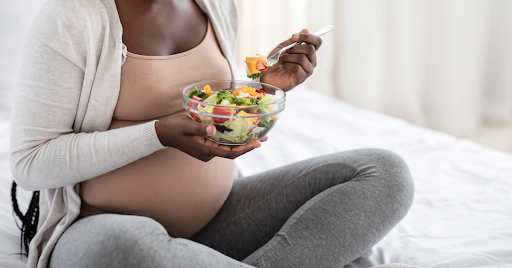For nearly forty years, the National Institute of Child Health and Human Development has recognized the importance of reducing prenatal infections in the US. They first focused on preventing mother-to-child transmission (MTCT) of HIV, but their efforts have expanded to other harmful infections during pregnancy.
Prenatal Infections to Be Aware Of
Our goal at Raleigh OB/GYN Centre is to take care of our prenatal patients like our own family. When you choose to partner with us for your obstetrical care, you will be in wonderful hands at every step of your journey. Some of these infections during pregnancy are rare in the US but can be dangerous and have serious effects on both mother and baby.
Listeriosis
Listeriosis is one of the rare but potentially serious infections during pregnancy caused by bacteria called Listeria. Listeria is spread through contaminated food. The symptoms of listeriosis are similar to the flu and may include fever, muscle aches, and unusual fatigue. However, listeria infections in pregnant women can lead to miscarriage, premature delivery, and even stillbirth. The infection can be passed on to the baby, which can be life-threatening.
The following foods have been linked to listeriosis and should be avoided during pregnancy:
- Unpasteurized/raw milk and dairy products (cheese, yogurt, ice cream, etc)
- Undercooked meat
- Luncheon meats and deli meat
- Any type of sprouts that are raw or not completely cooked
- Cut melon that has been left at room temperature for more than 4 hours
According to the Centers for Disease Control and Prevention (CDC), pregnant women are 10 times more likely than other people to get listeriosis. Other groups at elevated risk include newborns, people with weakened immune systems, and older adults.
Zika Virus
Zika virus is primarily spread by infected mosquitoes, but you can become infected by having unprotected sex with someone who already has the virus. Zika infection during pregnancy may cause serious birth defects like microcephaly and brain defects. To prevent Zika infections during pregnancy, you exercise caution when traveling to areas with a high incidence of Zika infection. The CDC has a Zika Travel Recommendation Map for individuals to consult. Women who are pregnant or are planning to get pregnant should avoid regions where the virus is prevalent. Other ways to protect yourself against Zika if you might be at risk include following recommendations on preventing mosquito bites and using a condom to prevent sexual transmission.
Group B Streptococcus
Group B strep (GBS) is a common bacteria that approximately 1 in 4 women carry. Most women do not feel sick when they carry these bacteria. GBS can be passed to a baby during childbirth, which can be life-threatening to newborns and infants. Complications can include fever, meningitis, breathing difficulties, pneumonia, and blood infection (sepsis). However, GBS infection in babies can be prevented. Doctors recommend getting tested for GBS near the end of pregnancy. If the test is positive for a group B strep infection, the mother will be given antibiotics during childbirth to protect the baby.
Cytomegalovirus (CMV)
Like GBS, Cytomegalovirus (CMV) is one of the more common infections during pregnancy that many people have. According to the CDC, more than half of adults have had a CMV infection by the time they reach 40. Most people do not know they have it. Pregnant women can pass CMV to their babies. Babies with congenital CMV infections are often healthy and show no signs of infection. However, some babies will have long-term health problems like hearing loss, vision loss, developmental delays, and seizures.
Since CMV spreads through bodily fluids, women can reduce their risks by avoiding contact with the urine and saliva of babies and young children (who are more likely to spread CMV than older kids and adults). Food or utensils shouldn’t be shared with babies and young children, and good hand hygiene should be practiced, especially after changing diapers.
General Tips for Preventing Infections During Pregnancy
Along with following specific guidelines for the above prenatal infections, there are some other things you can do to prevent infections during pregnancy, including
- Practice good hygiene
- Avoid people with infections
- Get tested for sexually transmitted infections (STIs)
- Ask your doctor about getting vaccinated
- Only take vitamins and supplements approved by your doctor.
- Do not touch dirty cat litter.
- Avoid contact with rodents, lizards, and turtles. This includes both wild animals and those kept as pets.
Raleigh OB/GYN Centre has been serving the women of the Raleigh, NC, area for more than 40 years. Our team of healthcare providers offers personalized and comprehensive care for women in all stages of life, including during pregnancy. If you have concerns or questions about having a safe and healthy pregnancy, or for more questions about infections during pregnancy, call our office at (919) 876-8225 to make an appointment.











